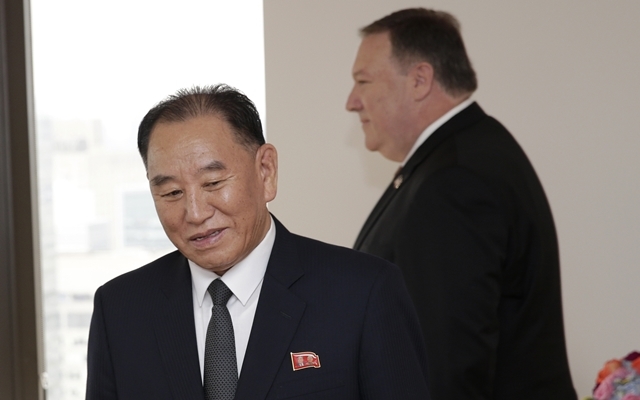 |
|
US Secretary of State Mike Pompeo and Kim Yong-chol, vice chairman of North Korea’s Workers’ Party (WPK) and director of its United Front Department, discuss the details of the North Korea-US Singapore summit in New York in May. (AP/Yonhap News)
|
Speculations abound concerning N. Korea-US high-level talks
After the UN Security Council Sanctions Committee on North Korea decided on Nov. 23 that it would recognize an inter-Korean survey of North Korean railroads aimed at connecting them with South Korean railroads as an exception to sanctions on the North, the next question is how this will affect North Korea-US dialogue moving forward. For the time being, eyes are turning to the high-level talks between North Korea and the US, which have already been delayed once. Through the afternoon of Nov. 25, multiple officials in the South Korean government said that the North Koreans had not provided an answer about the schedule of the talks. The high-level talks need to be held soon if the second North Korea-US summit is to be pulled off this coming January. This explains the emphasis on the high-level talks taking place before the end of November. Since US Secretary of State Mike Pompeo is supposed to accompany US President Donald Trump to the G20 Summit held in Argentina on Nov. 30, the prevailing view has been that the talks would have to be held prior to that, around Nov. 28. Considering the time it would take North Korean Kim Yong-chol, vice chairman of the Workers’ Party of Korea and director of its United Front Department, to travel to the US, such a trip would only be possible if the schedule were finalized within a day or two. Sources close to South Korea’s Ministry of Foreign Affairs think it’s still possible for the high-level talks to be held this month. “The [North Korea-US high-level] talks were already arranged and then delayed because of scheduling [problems], so I’m told that [the Americans] are ready to hold them at any time, as soon as they get the signal [from North Korea],” one diplomatic source said. “We’ll have to see how things go over the next day or two. It wouldn’t be strange for the talks to be pushed back into December because of scheduling issues,” another source said. In short, the talks haven’t been scheduled yet, but neither is there anything worth regarding as a “disturbing signal” between North Korea and the US. In a related development, there’s a growing consensus that the UN Security Council’s decision to exempt the inter-Korean joint survey from sanctions is separate from the US Defense Department’s announcement on Nov. 21 of its plan to scale back its 2019 Foal Eagle joint military exercise with South Korea, a measure that was presumably aimed at promoting negotiations over denuclearization, including the high-level North Korea-US talks. “It would be presumptuous to assume that the UN Security Council’s decision to grant an exemption to the sanctions has implications for North Korea-US negotiations per se. What this mean is that our government considered the project important and that the deliberations [with the US] went well,” a South Korean government official said. “The Americans had been obstructing the project because of their impression that South Korea was pushing inter-Korean relations forward too quickly. After a long period of discussion [between the South Korean and American governments], which were able to share opinions during talks every other week in the working group, [the US] agreed [to provide an exemption from the UN sanctions] to encourage these efforts,” another government official explained. By Kim Ji-eun, staff reporter Please direct comments or questions to [english@hani.co.kr]






